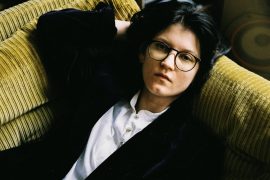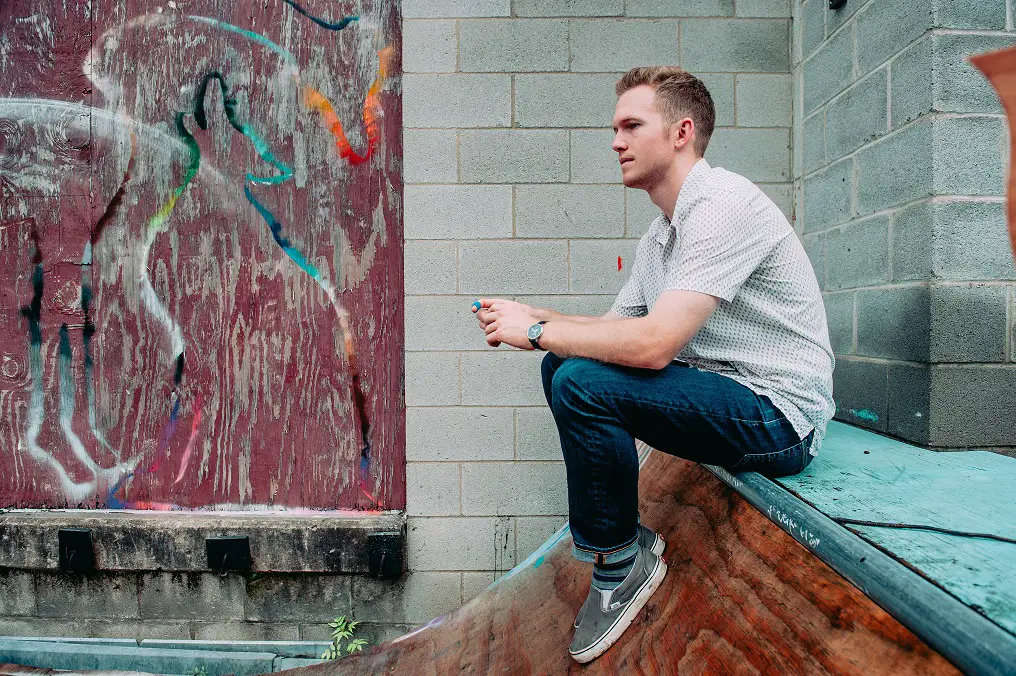If you are singer, you have to learn to at least like how you sound, because you have to be able to convey some semblance of emotion when you sing.
Atlanta, Georgia is known for a handful of things: chicken and waffles, Coca Cola, hip-hop. Pop/rock, as to be expected, is not one of these things.
But why can’t it be?
Small Reactions, an Atlanta-based four piece, are here to prove that there’s more to Atlanta’s music scene than meets the eye. The group first formed a few years back, and released their debut LP, Similar Phantoms, in 2014. Their sound incites feelings of New Wave nostalgia mixed with modern pop-rock panache, and draws out emotional connectivity with their narrative lyricism. They’ve described their sound as “situational pop music,” and it shows.
Atwood Magazine recently chatted with Small Reactions’ vocalist/guitarist, Scotty Hoffman, and drummer Sean Zearfoss, via email. The band are due to release their sophomore album, RXN_002, on August 4, and in learning more about the group, it became clear that Small Reactions are carving out an intriguing niche for themselves within a unique musical landscape. Moreover, the group has made an Atwood-exclusive Spotify playlist, including specific tracks that have inspired their own music.
Listen: “Sessions Street” – Small Reactions
[soundcloud url=”https://api.soundcloud.com/tracks/326564801″ params=”auto_play=false&hide_related=false&show_comments=true&show_user=true&show_reposts=false&visual=true” width=”100%” height=”150″ iframe=”true” /]A CONVERSATION WITH SMALL REACTIONS
Atwood Magazine: Atlanta's music scene seems primarily saturated by hip-hop and R&B - have you found it difficult to break into the scene as a rock band?
Scotty: Not particularly – Atlanta is an interesting town in that there’s a wide variety of musicians in different genres all at the top of their game. Shows that pull in different acts are always interesting because then you aren’t just watching four rock bands in a row – you get a hip hop act, you get someone playing the harp, and you get a dance-y electro-pop group. But then at the same time within the ‘rock’ scene – if you can even call it that – no one is really copping the same sound as anyone else.
I hear a variant of sounds in your songs - the guitars are very wet, and the vocals remind me of a lot of Brit rock from the 60s & 70s. Do you tend to draw from similar influences? Or, is there an influence that would be particularly surprising to people, based on your music?
Scotty: I do like the early Kinks a lot, as well as Brian Eno/Roxy Music/David Bowie throughout the 70s. I can’t say that any of it has a direct influence but I’m sure it’s there subliminally. Especially Eno–I could never pull off writing an Eno-esque song, but his solo output in that decade is still an inspiration to me. A surprising influence (based on how we sound) maybe someone like Nico, Scott Walker, Edith Piaf, Nina Simone, Billie Holiday, Prince, or Trish Keenan . . . a vocalist – at least for me. If you are singer, you have to learn to at least like how you sound, because you have to be able to convey some semblance of emotion when you sing. For better or worse, you have a unique voice that you can either learn to use or not. But you should learn to use it.
What was the first album you ever owned?
Scotty: I remember as a really young kid, I heard Fine Young Cannibal’s She Drives Me Crazy and Tiffany’s I Think We’re Alone Now a lot – I’m not sure how because those songs would’ve been released before I was cognizant of anything. The first album I actually saved money for, to go and buy, was 2Pac’s Greatest Hits which really got me into wanting to write and play music.
Sean: The first album I ever owned, in 5th grade, was Weird Al’s Bad Hair Day. The album that made me want to play music, though, was Black Sabbath’s Paranoid, which I heard for the first time a few years later.
If you could add any instrument to your band that's not already there, what would you choose and why?
Scotty: Glockenspiel or bells or marimba. Anything that sounds like “Music for Mallet Instruments” from Steve Reich. Or the last 20 seconds of “Take Me With U” from Prince.
Sean: More synth. But I’ve always wanted two drum sets in the band, too, to make the band more rhythmically complex and allow more room for krauty, repetitive, or droning types of songs and improvising. The first band I ever heard was The Allman Brothers, so I’ve heard the dual drummer thing for as longs as I can remember. The Grateful Dead did this well, too, which I picked up on a little later in life. I still love both bands and how rhythmically complex and interesting each could be. To connect this back the unexpected influence question, I’ve been influenced by jam bands with two drummers. Thee Oh Sees do this now as well, helping to bring this idea into a more current time and space we reside in.
I think our goal has always been to make pop songs from left field.
You've described your music as 'situational pop songs.' What is one particular situation you can think offhand that has been a continued narrative theme for you?
Scotty: Having kids at really young age and feeling relegated to a frighteningly normal and domestic atmosphere, but also the perception and benefits that goes along with that. I go to it a lot in songs, but it’s a fairly unique perspective I think, at least in our music. I’ve spent a lot of time feeling like Sylvia Plath in Ariel when she describes herself as “cow-heavy and floral.” Same.
Who or what inspired the new album?
Scotty: Aside from a nonstop glut of songs – we’ve had two cassettes out in last year – the departure of one of our founding members had a large effect on this record, because there was a rather large space to fill. There is less noise and more room for other things – vocals, musique-concrete-ish things, spoken word, etc. The songs also took shape more as “songs” and less improvisations as on the first record. Some of the first record provides a link to this one – “Keepah” maybe, or “Betamax.”
Sean: I think our goal has always been to make pop songs from left field. We like everything to have strong, catchy, hummable melodies, but still challenge the listener. The songs are noisy, fast, repetitive, and lyrically dark, so there is a juxtaposition there. Trying to master that juxtaposition has been a kind of inspiration for us.
Listen: “Keepah” – Small Reactions
If you didn't live in Atlanta - and not saying that you want to move - where would you go?
Scotty: Japan? The European countryside? In the U.S. I would move to Los Angeles or New York. I wouldn’t mind to [get the fuck out] of the U.S. for the next few years, though.
Sean: Canada has seemed appealing for a long time.
I know you've mentioned that you all have 'day jobs' as well as being in the band - is that still true? Or have you been able to do music full-time now?
Scotty: I still have a day job and I’m in school. Colin Newman says you can live as a creative person but you have to be creative in how you do it–or something to that effect. We know a lot about business basics and contracts from being musicians, that’s for sure.
Sean: I teach first year composition, English 1101 and 1102, at Kennesaw State University. I also work part-time at one of our local record stores, Criminal Records, here in Little 5 Points and a music venue in East Atlanta Village called the EARL.
If you could sum up your music in 5 words or less, what would you say?
Scotty: Rhythm nation doo-wop dream pop.
Sean: Pop. Noise. Kraut. Drone.
What is one thing you want people to know about you?
Scotty: I am teaching myself drums.
Sean: In addition to my cat, Toby, I’ve been feeding a cat outside that I named Epic Soundtracks. East Point [Atlanta] is a great place for stray cats.
— —
:: Preorder RXN_002 here ::
— — — —
Preorder RXN_002 here ::
— —









